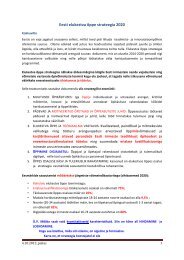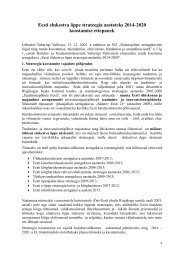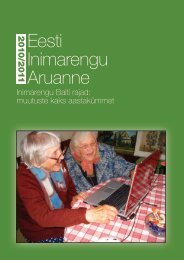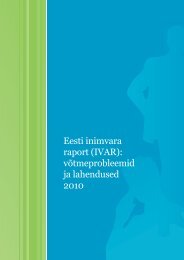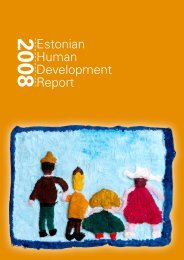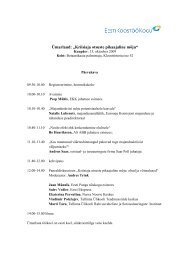DEVELOPMENT
The pdf-version - Eesti Koostöö Kogu
The pdf-version - Eesti Koostöö Kogu
Create successful ePaper yourself
Turn your PDF publications into a flip-book with our unique Google optimized e-Paper software.
• C –the “Estonia-centred” supporters of income<br />
gap reduction. They are critical of integration with<br />
the world and the EU, as well as support the reduction<br />
of income differences – 23% of the respondents;<br />
• D – the “Estonia-centred” rejecters of income gap<br />
reduction. They are not happy about the policies<br />
that promote globalisation or income equality – 11%<br />
of the respondents.<br />
The globalists favouring the income gap reduction include<br />
an above average share of PhDs and below average share of<br />
politicians, while the group of globalists that rejects income<br />
equalisations has a greater representation of economic elite<br />
and, especially, entrepreneurs. We find a large number<br />
of cultural figures, but also politicians, among this Estonia-centred<br />
group, which favours income equalisation. Yet,<br />
of both cultural figures and politicians, a minority (less than<br />
a third) belong to the above group. Among the economic<br />
elite this combination of attitudes is clearly unpopular.<br />
Groups A and C tend to favour increasing the role of<br />
the state, more than the others do. Both of these groups very<br />
strongly support increasing the role of the state in regional<br />
policies, and the promotion of educational activities. Group<br />
C, characteristically, places greater emphasis on the role<br />
of the state in social security, in the organisation of ethnic<br />
relations and in healthcare policies, but also in the development<br />
of economic structures. For this part of globalists who<br />
favour equalisation, the corresponding spheres of activity<br />
Table 5.3.2<br />
Support for various organisational forms in policymaking, %<br />
Entrepreneurs<br />
Economic<br />
policymakers<br />
Politicians<br />
Cultural figures<br />
PhDs<br />
Total<br />
are the promotion of innovation, management of migration,<br />
and the improvement of the environment. The globalists<br />
that reject income equalisation also indicate less than average<br />
support for increasing the role of the state in the spheres<br />
of activity under observation. However, more than 50% of<br />
them still support the strengthening of the state’s role in<br />
regional development and the organisation of education.<br />
5.3.3<br />
Cooperation and development networks<br />
in the shaping of policy<br />
In addition to the content of policies, an important issue<br />
is the matter of the mechanisms used to create and realise<br />
these policies. Some theoreticians believe that at least<br />
five or six variants can be differentiated, depending on<br />
the level of state domination, starting from total statism,<br />
where the state is not interested in any kind of involvement<br />
or feedback, and ending with the “Dutch” approach<br />
to procedures, in which policies are actually developed by<br />
the concerned parties, and the state controls the process<br />
from a distance and indirectly (Peters &Pierre, 2006). In<br />
this study, we differentiated three methods:<br />
• Civil servants authorised by the politicians are the<br />
developers and the organisers of the realisation process.<br />
The goal is speed and efficiency, and if necessary,<br />
experts are invited to participate in the process<br />
of policymaking. Consulting with interest groups is<br />
not considered important –if it is done, it tends to<br />
be a formality.<br />
• In the course of creation (and if possible, in the implementation)<br />
of the policies, meaningful cooperation<br />
takes place with the umbrella organisations of societal<br />
institutions (e.g. employers, employees, organisations<br />
representing the rural population, professional associations,<br />
etc.). However, narrower interest groups or<br />
individuals are not allowed access to the process.<br />
Establishing objectives and<br />
developing solutions is primarily<br />
the task of politicians<br />
and state officials<br />
When establishing objectives<br />
and developing solutions,<br />
the state should organise<br />
cooperation with the<br />
umbrella organisations of<br />
the important social partners<br />
(corporativist option)<br />
The establishment of objectives<br />
and development of<br />
solutions must be organised<br />
so that it is possible for all<br />
the interest groups and<br />
individuals to participate<br />
(network-based option)<br />
15 2 5 3 11 6<br />
31 24 33 23 50 33<br />
54 74 63 74 39 61<br />
• Network-type cooperation, in which all the interested<br />
parties, including individuals, are allowed to<br />
participate and to express their opinions.<br />
We got the following results when we asked the respondents<br />
to indicate which form of policymaking they preferred<br />
(Table 5.3.2). If we exclude PhDs the network-based<br />
option for policymaking was favoured overwhelmingly.<br />
The question is, to what extent does this result reflect<br />
strong democratic aspirations, and to what extent a limited<br />
trust in the state, or the weakness of the representative<br />
organisations in Estonia. The most favoured option<br />
may be very promising, and if it succeeds, it could open<br />
up important opportunities for the social mobilisation of<br />
the population in economy-related matters; but in practice,<br />
this is far from easy to implement.<br />
References<br />
1. Chang, H.-J. (2001) Kicking Away the Ladder. Development<br />
Strategy in Historical Perspective. Anthem.<br />
2. Kuusk, K. (2012). Eksperimenteeriv majanduspoliitika. Tallinn:<br />
Estonian Development Fund.<br />
3. OECD (2011). OECD Public Governance Reviews. Estonia. Paris.<br />
4. Peters, B.G., & Pierre, J. (2006) Governance, Government and<br />
the State, The State. Theories and Issues. Ed by C. Hay & D.<br />
Marsh. Basingstoke (UK) and New York: Palgrave Macmillan.<br />
5. Võtmevaldkond: Riigivalitsemine. Ekspertrühma raport. Estonian<br />
Development Fund 2010.<br />
Estonian Human Development Report 2012/2013<br />
203



